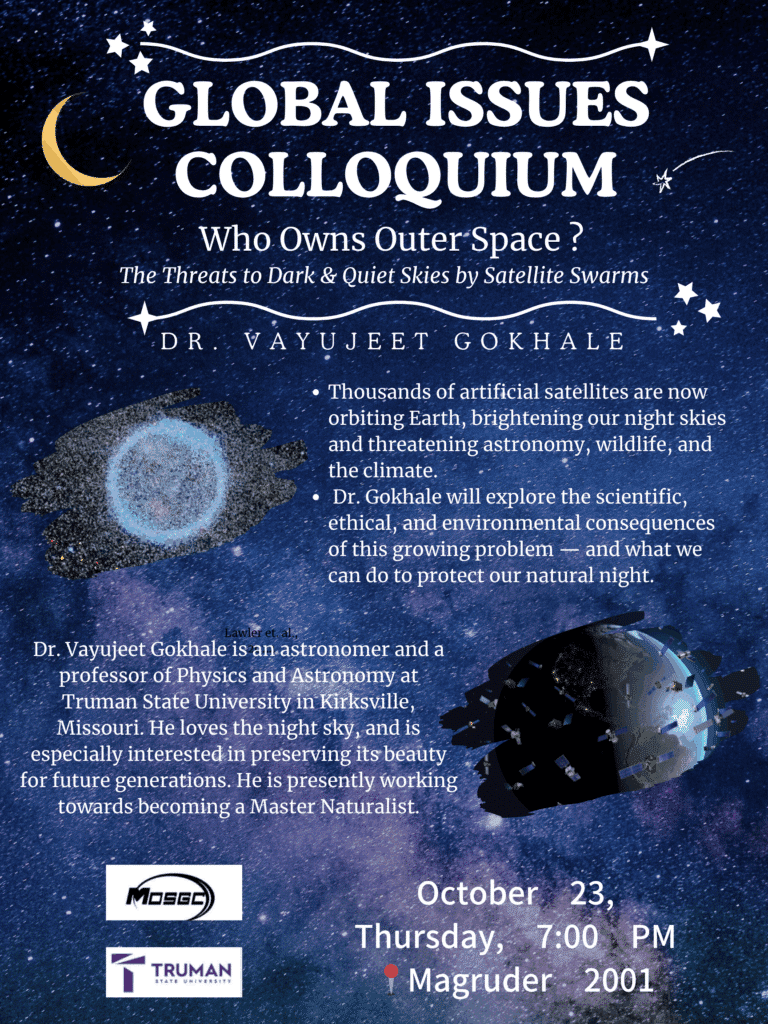Take a tour of some of the world’s hottest issues! For more than a decade, Truman State University’s Global Issues Colloquium has been helping the Truman community understand many of the most challenging questions, conflicted responses and hopeful developments facing various governments and societies.
Thursday, October 23, 2025, 7pm, MG2001
Vayujeet Gokhale, “The Threats to Dark & Quiet Skies by Satellite Swarms”

Ground-based astronomy is facing several challenges, both from the growing use of artificial light at night (ALAN) and increasingly from the proliferation of commercial activity and large satellite swarms in low Earth orbit (LEO) around Earth. In just the last decade, the number of satellites in LEO has increased from about 2,000 to close to 10,000 (McDowell, 2025). Within the next few years and decades, this number is expected to rise at least by one order of magnitude (Falle et al., 2023), which means that at any moment, several dozen satellites will be above the horizon from any location of our planet throughout the night, not just around twilight. Moreover, each of these satellites has a finite lifetime of between three to five years, which implies re-entry of hundreds of satellites into the Earth’s atmosphere every day. The burn-off from these reentries will add several tons of heavy metals into the Earth’s upper atmosphere on daily basis, the implications of which on weather and climate patterns are largely unknown.
Most of the non-astronomy and space-industry community is largely oblivious to these developments, and this talk is a modest attempt to bridge this gap in our community. I will discuss the implications of an increasingly crowded LEO on not only astronomers and humans, but also the impact of these activities on wildlife and the ecological health of the Earth and the space surrounding it. I will then explore the cultural, ethical, scientific, commercial, military, and legal aspects of these satellite swarms that are infesting Low Earth Orbit. Finally, I will discuss the efforts made by astronomers to mitigate, regulate, and address this growing environmental problem, and offer ideas about ways in which other humans can help astronomers preserve and cherish the space around our pale blue dot, the only home we have ever known.

Credit: NOIRLab/NSF/AURA/P. Marenfeld
Vayujeet Gokhale is a professor of physics & Astronomy at Truman State University. He earned his BSc. in physics (’96) and MSc. in nuclear physics (’98) from the University of Bombay, followed by a PhD in astronomy from Louisiana State University (2007). He is increasingly involved in efforts to help protect the natural nighttime environment in his community, across Missouri and beyond. He is a Missouri Master Gardener, Missouri Pollinator Steward, and is presently training to be a Missouri Master Naturalist. Dr. Gokhale loves the night sky and National Parks, and dreams of becoming an astronomy park ranger at the Arches National Park in Utah.
RELATED LINKS:
- Study Abroad Opportunities
- Political Science and International Relations Major and Minor
- International Studies Minor
- Peace Corps Prep Program